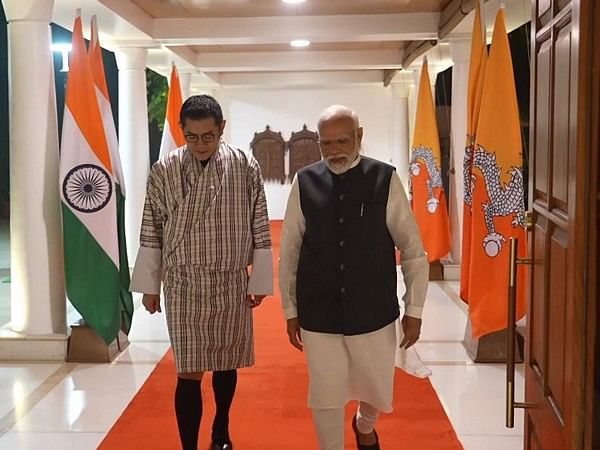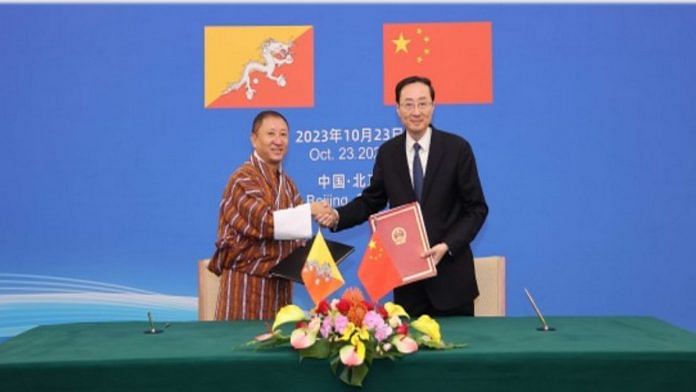Bhutanese leaders and officials made two significant diplomatic visits in the last few weeks, one to China and the other to India.
In October, Bhutanese foreign minister Tandi Dorji’s trip to China for the 25th round of boundary talks marked a momentous diplomatic milestone in China-Bhutan relations. During Dorji’s visit, the first by any Bhutanese foreign minister to China, the two countries finalised a Cooperation Agreement outlining the responsibilities and functions of the Joint Technical Team (JTT) on the delimitation and demarcation of the boundary. This was a major move forward after the 2021 three-step roadmap to expedite boundary negotiations.
Shortly afterward, Bhutanese King Jigme Khesar Namgyel Wangchuck embarked on a week-long visit to India from 3-10 November.
These diplomatic interactions are closely intertwined due to the ongoing boundary dispute between China and Bhutan. Any potential resolution has profound implications for India and broader India-Bhutan relations.
So, where do things stand now?
Diplomatic relations between China and Bhutan are still non-existent. This is primarily attributed to Bhutan’s stance against establishing diplomatic ties with the P5 countries— the permanent members of the UN Security Council, which include China, the US, the UK, France, and Russia.
Additionally, Bhutan’s strong ties with India, including the 1949 treaty of friendship (which was updated in 2007), and the unresolved border dispute with China remain barriers to the fostering of diplomatic connections between China and Bhutan.
Also Read: Beijing is neutral on Israel-Palestine conflict. But Chinese people are saying something else
Warming China-Bhutan relations
China’s willingness to establish diplomatic ties with Bhutan has been visible for a decade now.
China’s foreign minister Wang Yi waxed eloquent about this to his Bhutanese counterpart Dorji during their meeting on 23 October.
“China and Bhutan are linked by mountains and rivers and enjoy profound traditional friendship. The conclusion of boundary negotiations and the establishment of diplomatic relations between China and Bhutan fully serve the long-term and fundamental interests of the country and nation of Bhutan,” he said.
On his part, Dorji said that Bhutan “firmly abides” by the so-called One-China policy.
China, notably, intensified its engagement with Bhutan following the 2017 Doklam standoff, when several Indian Army units crossed over and formed a human wall to stop Chinese soldiers from building a road that would have provided access to Indian territory.

China has been actively constructing extensive infrastructure near the Doklam region, adjacent to the Siliguri corridor, commonly called India’s ‘chicken’s neck’.
If Bhutan settles its boundary issues with China, India would be the sole country left with an unresolved land dispute with the latter. Such a resolution could potentially allow China to establish easier transport routes for troops and ammunition near India’s northeast border, exacerbating the already grave strategic and military challenge for India.
India’s strong response to Chinese advancements at the Bhutan-India-China trijunction during the Doklam standoff caught China off guard. This unexpected reaction prompted China to escalate negotiations with Bhutan and offer a temporary olive branch to India.
Consequently, it led to two informal summits between Indian Prime Minister Narendra Modi and Chinese President Xi Jinping in 2018 and 2019. However, the perceived warmth between India and China was short-lived. It was abruptly disrupted by the 2020 Galwan clashes, resulting in a deterioration of ties and prompting a major reassessment of India’s China policy
Unlike its approach with India, China has shown a strong interest in resolving the dispute with Bhutan and is prioritising the establishment of diplomatic relations with the country.
While many have suggested that Beijing’s reluctance to resolve the dispute with India is a deliberate pressure tactic, the view in China differs.
Large sections of the Chinese strategic community and media blame India for the Galwan clashes and the lack of resolution of the dispute. They view the absence of a resolution as stemming from a lack of political commitment by successive Indian governments, and the alleged exploitation of the dispute for domestic gains.
In contrast, many in China attribute the progress in the China-Bhutan dispute to Bhutan’s political willingness.
Also Read: Bhutan & China move to resolve border dispute as ties warm, could impact India’s interests
India at the core of China’s Bhutan policy
The recent talks between China and Bhutan have created a ripple of anxiety in India, as their outcome will have far-reaching consequences for the region’s geopolitical landscape and the intricate web of relationships between India, Bhutan, and China.
It is widely understood that China’s keen interest in settling the boundary issue with Bhutan is not solely about fostering amicable relations with the Himalayan Kingdom. Rather, it primarily revolves around attempting to diminish India’s influence in the region.
China’s expansion of its presence and influence in South Asia has been a growing concern for India. Despite having Pakistan as a steadfast ally in the region, China has had limited success with other South Asian countries in the past.
Bhutan historically maintained an ambiguous stance towards China, the Maldives has been inclined towards India under former president Ibrahim Solih’s India First Policy, and Sri Lanka experienced some drift due to concerns over China’s debt trap diplomacy.
However, recent regional developments signal a shift in China’s favour. The change in leadership in the Maldives to the “pro-China” Mohamed Muizzu and Bhutan’s expressed interest in establishing ties provide a window of opportunity for China to bolster its forays and efforts to curtail India’s regional influence, diverting the latter’s attention and leaving it in a more vulnerable position.
Within China, the narrative surrounding the Bhutan-China-India relationship emphasises how engagement with China could prove mutually beneficial, potentially disrupting India’s regional dominance.
A Weibo user even characterised the recent meeting and border developments between China and Bhutan as “a slap on India’s face”.
While there’s a sense of discomfort in India regarding the China-Bhutan developments, it is unlikely to significantly alter the dynamics of India-Bhutan relations.
Bhutan welcomes the possibility of establishing normal relations with China, but the significance and depth of its relationship with India cannot be underestimated.
This was underscored by the Bhutanese monarch’s visit to India following the foreign minister’s visit to China. It is crucial to recall Bhutan’s dedication to its relationship with India and its assurance last year that any resolution with China will not harm India’s interests. However, the methods and extent of achieving this goal remain unclear at this time.
China’s swift engagement with Bhutan signifies its strategic calculations to develop a credible containment strategy against India. These recent developments with Bhutan should be contextualised within the broader framework of China’s strategic objectives, particularly its South Asia policy and its approach to India. Following the emergence of the Indo-Pacific region and India’s growing closeness with countries such as the US and Japan, China has amplified its efforts to forge ties with Bhutan and India’s other neighbours.
It is crucial for Bhutan and other South Asian countries (barring Pakistan) to recognise that China’s engagement and projection of its interests in individual countries are an offshoot of its broader India policy. This trend has persisted over time, and the resolution of dispute with Bhutan (if and when it occurs) should also be perceived within the scope of this overarching strategy.
Sana Hashmi, PhD, is a fellow at Taiwan-Asia Exchange Foundation and George H.W. Foundation for US-China Relations. She tweets @sanahashmi1. Views are personal.
(Edited by Asavari Singh)



